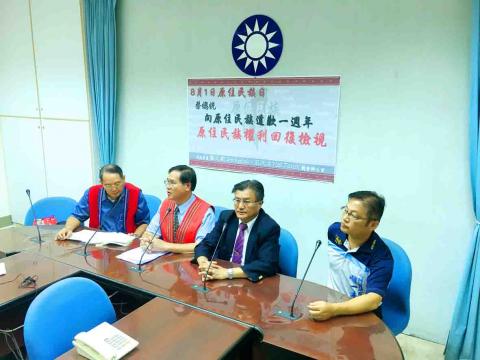One year after President Tsai Ing-wen (蔡英文) apologized to Aborigines on behalf of the nation, the Democratic Progressive Party (DPP) has not made any progress protecting Aborigines’ rights, rendering Tsai’s pledge an empty gesture, Chinese Nationalist Party (KMT) lawmakers said yesterday.
Tsai apologized mainly because the government did not enforce the Indigenous Peoples Basic Act (原住民族基本法) to create or amend laws to demarcate Aboriginal territories and grant Aborigines autonomy to hunt in areas that historically belonged to their ancestors, KMT Legislator Sra Kacaw, an Amis, said at a news conference in Taipei.
The Executive Yuan has not delivered its draft bill governing Aborigines’ land and waters to the legislator, which hampers legislative efforts to determine the territories, Sra Kacaw said, adding the DPP caucus’ draft to promote transitional justice does not include rules on the reinstatement of Aboriginal territories, while the KMT’s version does.

Photo: Cheng Hung-ta, Taipei Times
The DPP has not amended the Forestry Act (森林法) to allow Aborigines to utilize natural resources in their historical territories — a right given to them under Article 19 of the Indigenous Peoples Basic Act, he said.
KMT Legislator Yosi Takun, a Sediq, blasted the DPP caucus for repeatedly blocking bills on protecting Aborigines’ rights with its legislative majority.
Tsai a year ago made eight promises to Aborigines, but she only scraped the surface of those policies in a speech yesterday, Yosi said, attributing to the lack of progress to the DPP caucus taking a contrary policy direction to that of the president.
The KMT submitted a proposed amendment to the Wildlife Preservation Act (野生動物保育法) in a bid to decriminalize non-profit hunting by Aborigines, but the proposal was vetoed by the DPP nine times during plenary sessions, Yosi said.
A bill he proposed on curbing racial discrimination was voted down 11 times by the DPP, which said that the bill’s definition of race and ethnicity should be clarified, he added.
“President Tsai, you apologized at the Presidential Office Building, but no one outside the office paid any attention, because the DPP caucus has been the first to oppose [the KMT’s] motions,” he said.
The government has given Aboriginal affairs little importance as evidenced by the “paltry” NT$2 billion (US$66 million) budget earmarked under the Forward-looking Infrastructure Development Program for Aboriginal policies, he said.
Former minister of the Council of Indigenous Peoples Mayaw Dongi said the DPP’s only achievement was passing the Aboriginal Language Development Act (原住民族語言發展法), the body of which was finished by the former KMT administration.
“Only a few articles were added. The content was largely the same as the draft the Executive Yuan approved during the Ma administration,” he said.
Similarly, the KMT in 2015 said it would compensate Aboriginal villages NT$20,000 per hectare of forest over a logging ban previously placed on 80,000 hectares of Aboriginal reserves. The DPP last year raised the amount to NT$30,000 per hectare, he said.
“The council under Tsai has not really furthered Aborigines’ rights. For the most part, it merely pushed our work forward,” Mayaw said.

Alain Robert, known as the "French Spider-Man," praised Alex Honnold as exceptionally well-prepared after the US climber completed a free solo ascent of Taipei 101 yesterday. Robert said Honnold's ascent of the 508m-tall skyscraper in just more than one-and-a-half hours without using safety ropes or equipment was a remarkable achievement. "This is my life," he said in an interview conducted in French, adding that he liked the feeling of being "on the edge of danger." The 63-year-old Frenchman climbed Taipei 101 using ropes in December 2004, taking about four hours to reach the top. On a one-to-10 scale of difficulty, Robert said Taipei 101

Taiwanese and US defense groups are collaborating to introduce deployable, semi-autonomous manufacturing systems for drones and components in a boost to the nation’s supply chain resilience. Taiwan’s G-Tech Optroelectronics Corp subsidiary GTOC and the US’ Aerkomm Inc on Friday announced an agreement with fellow US-based Firestorm Lab to adopt the latter’s xCell, a technology featuring 3D printers fitted in 6.1m container units. The systems enable aerial platforms and parts to be produced in high volumes from dispersed nodes capable of rapid redeployment, to minimize the risk of enemy strikes and to meet field requirements, they said. Firestorm chief technology officer Ian Muceus said

MORE FALL: An investigation into one of Xi’s key cronies, part of a broader ‘anti-corruption’ drive, indicates that he might have a deep distrust in the military, an expert said China’s latest military purge underscores systemic risks in its shift from collective leadership to sole rule under Chinese President Xi Jinping (習近平), and could disrupt its chain of command and military capabilities, a national security official said yesterday. If decisionmaking within the Chinese Communist Party has become “irrational” under one-man rule, the Taiwan Strait and the regional situation must be approached with extreme caution, given unforeseen risks, they added. The anonymous official made the remarks as China’s Central Military Commission Vice Chairman Zhang Youxia (張又俠) and Joint Staff Department Chief of Staff Liu Zhenli (劉振立) were reportedly being investigated for suspected “serious

American climber Alex Honnold is to attempt a free climb of Taipei 101 today at 9am, with traffic closures around the skyscraper. To accommodate the climb attempt and filming, the Taipei Department of Transportation said traffic controls would be enforced around the Taipei 101 area. If weather conditions delay the climb, the restrictions would be pushed back to tomorrow. Traffic controls would be in place today from 7am to 11am around the Taipei 101 area, the department said. Songzhi Road would be fully closed in both directions between Songlian Road and Xinyi Road Sec 5, it said, adding that bidirectional traffic controls would